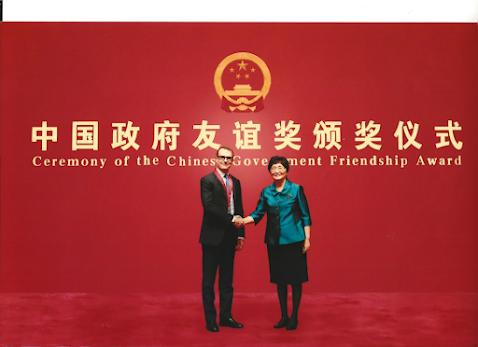Linda Wong: Mobilsing Youth's Engagement in Land Restoration and Combating Desertification | On UNCCD YES
Water resources and land restoration are intimately linked to the rise and fall of human civilization. In July 2023, my colleagues and I organized a field investigation to the arid regions of northern and northwestern China. This research expedition was part of our "Biodiversity Study in Arid Regions" program (2021-2030), a decade-long project echoing the United Nations' Decade on Ecological Restoration. The experiences from this research trip left us with profound and awe-inspiring impressions. One crucial question that emerged was: How can young people actively engage in the governance of combating desertification and restorating healthy lands?
As an observer of the United Nations Convention to Combat Desertification (UNCCD), the China Biodiversity Conservation and Green Development Foundation (CBCGDF) has long been engaged in addressing issues related to desertification control. Over the years, during numerous sessions of the Conference of the Parties (UNCCD COPs), I have had the privilege of engaging in discussions on this topic with international colleagues.
Based on my observations and experiences, I believe that the key barriers preventing young people from actively participating in land restoration, desertification prevention, land degradation mitigation, and drought alleviation are multifold, as i will explain in the following texts. How to enpower youth in land restoration and combating desertification?
Young people play a vital role in addressing global challenges such as land restoration, desertification prevention, land degradation, and drought mitigation. However, their active participation in these critical issues faces several key barriers that must be addressed to harness their full potential. Let's exammine the reasons first.
a) Lack of Education and Awareness. One significant obstacle is the inadequate education and awareness among young individuals regarding these environmental concerns. Many youths may not fully comprehend the severity of land degradation and its far-reaching consequences. Without proper education and awareness campaigns, their engagement remains limited.
b) Insufficient Knowledge and Skills. Youth often lack the necessary knowledge and skills to actively contribute to land restoration and combat desertification. These issues require specialized expertise in sustainable land management, conservation practices, and water resource management. Insufficient access to relevant training and skill-building opportunities further hampers their involvement.
c) Economic and Social Pressures. The economic and social pressures faced by young people can deter their active participation. Many young individuals must prioritize livelihoods and economic stability, leaving them with limited time and resources to engage in environmental initiatives. Addressing these pressures is crucial to enable their involvement. In some arid and impoverished rural areas of China, young people have chosen to leave their hometowns and seek job opportunities in distant coastal cities in pursuit of a better material life. This decision has led them away from their hometowns and, consequently, away from opportunities for engagement.
d) Political Barriers. Some youths may encounter political barriers that restrict their engagement. These obstacles may include limited representation in decision-making processes or exclusion from policy discussions. Empowering young people to participate in these processes is essential for effective action. Against the backdrop of rural revitalization, the participation of young people is particularly crucial.
e) Lack of Social Recognition and Resources. The lack of recognition and resources for youth-led initiatives in land restoration and environmental conservation is a significant challenge. Without adequate support and resources, young individuals may struggle to implement their ideas and initiatives effectively.
I have attended many international conferences where the term "youth" is frequently mentioned. However, genuine participation by young people is often quite limited. In some cases, it even turns into "Youth-wash" — it may appear as though there is a room for young people, but their presence is scarce; they're not on the table; their roles are reduced to mere decoration. We relly need to do more to get youth well-prepared to overcome these barriers and toempower young people in the mission of land restoration, desertification prevention, land degradation, and drought mitigation. This approach should include:
a) Education and Awareness Proomtion. Implement comprehensive educational programs and awareness campaigns targeting young individuals to enhance their understanding of these environmental challenges.
b) Training and Skill Development. We shall provide accessible training and skill development opportunities, equipping youth with the expertise needed to actively contribute to land restoration efforts.
c) Economic and Social Support. Create avenues for economic stability and social support to alleviate the pressures that deter youth engagement. This can include offering incentives for participation and acknowledging their contributions.
d) Resource Allocation. Allocate resources and funding to support youth-led initiatives and projects focused on land restoration and combating desertification.
I am confident that by addressing these barriers and actively involving young people, we can tap into their innovative ideas, energy, and commitment to make a substantial impact on land conservation and environmental sustainability. Empowering youth is not just an option; it is a necessity for a greener and more sustainable future.
#UNCCD#
By Linda
Editor: Daisy
Contact: v10@cbcgdf.org; +8617319454776

Contribution
Do you know? CBCGDF is a non-profit organization. We rely on crowd-funding and donations. You have the opportunity to help us to advance biodiversity conservation. Donate TODAY to power up the movement to make it a better world for all life.
https://www.paypal.me/CBCGDFChina
http://www.cbcgdf.org/English/ConfirmDonaTion/0.html



Comments
Post a Comment